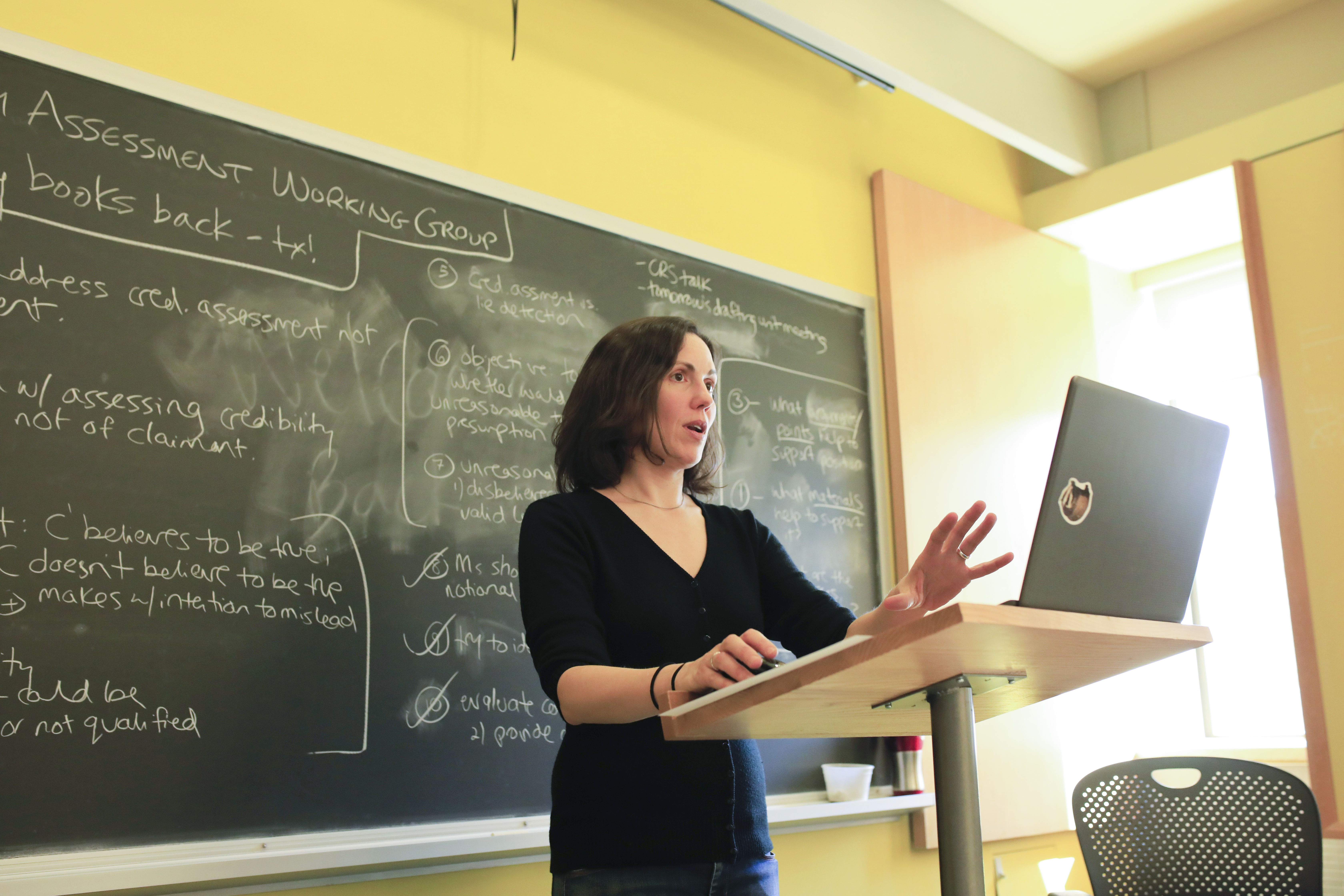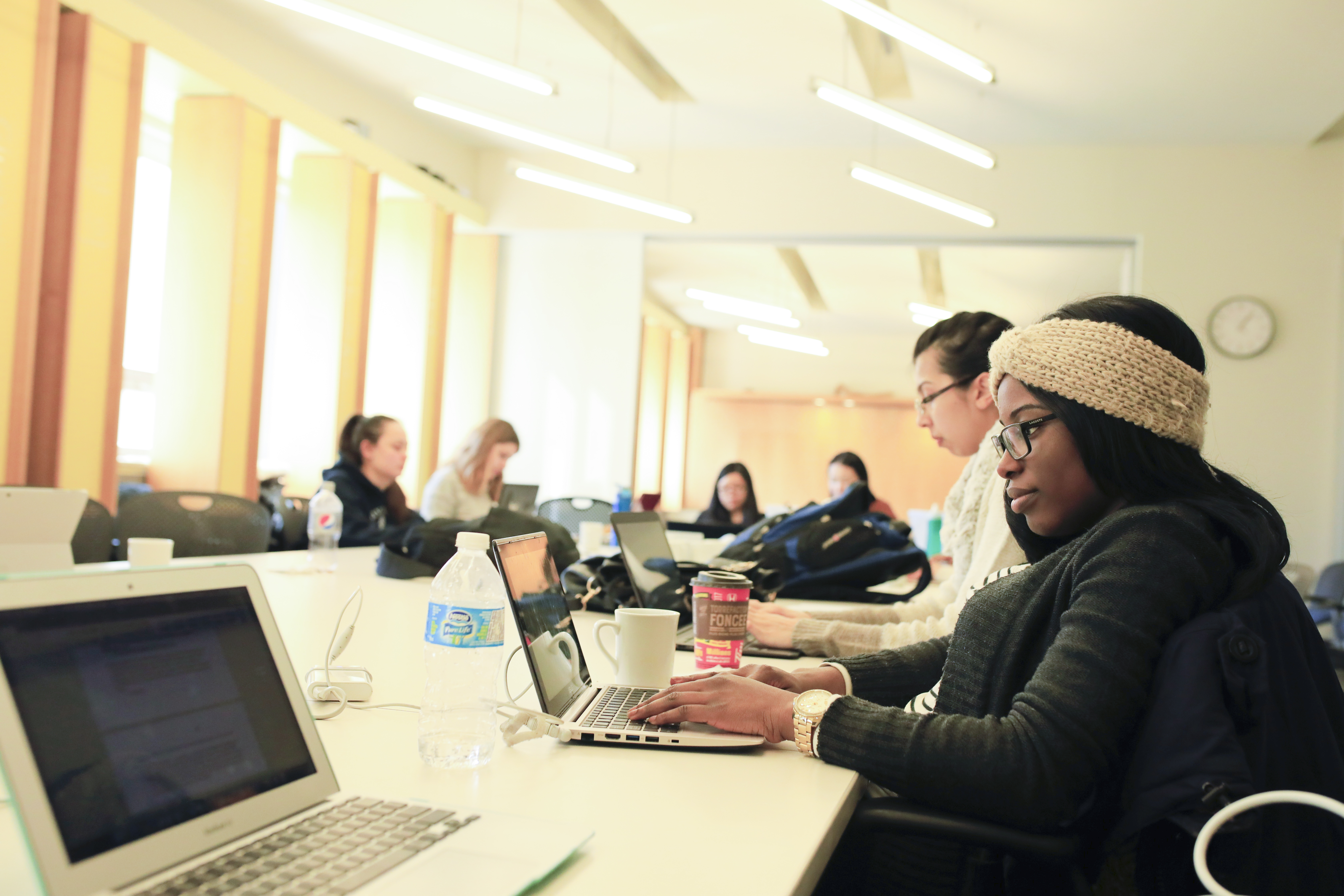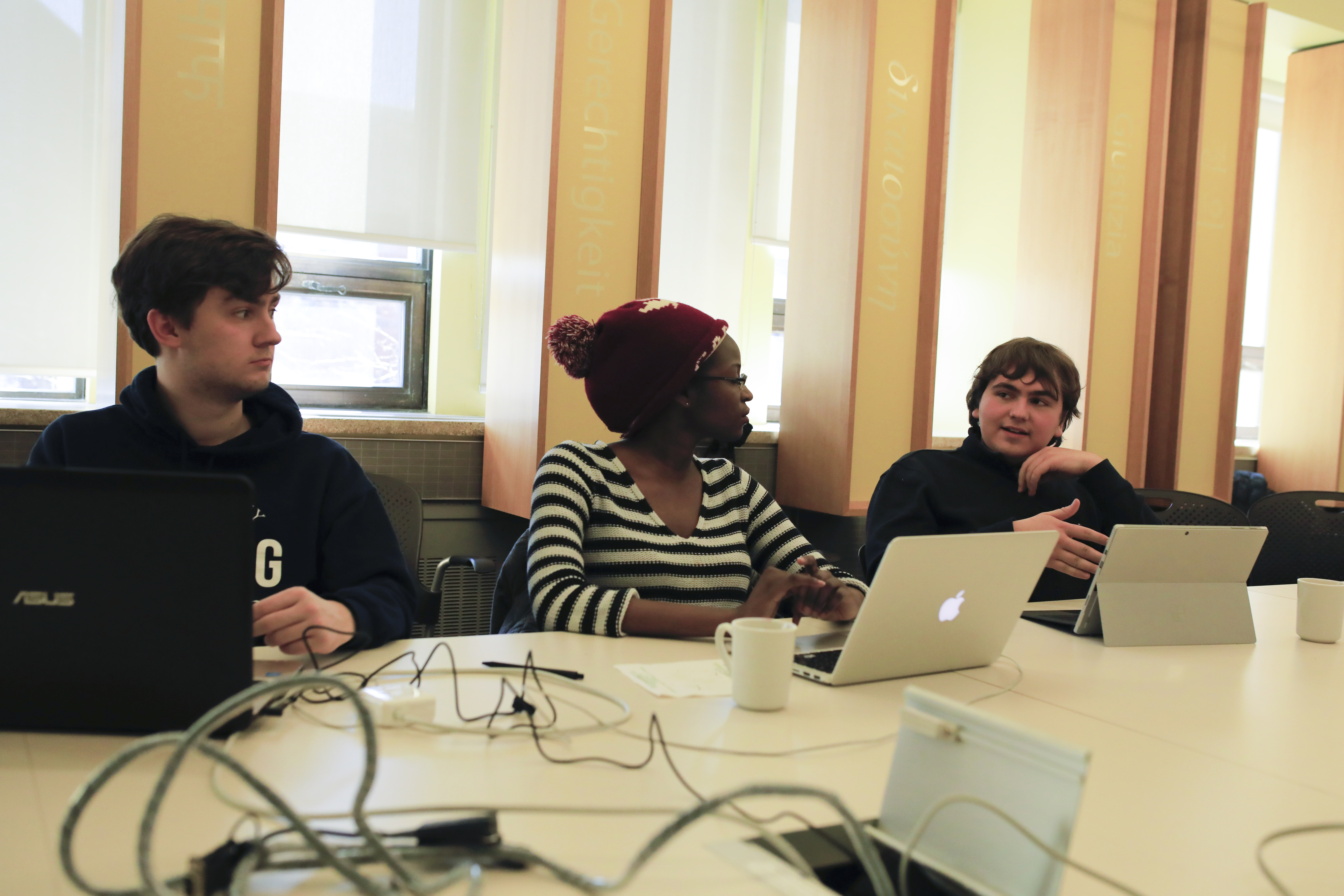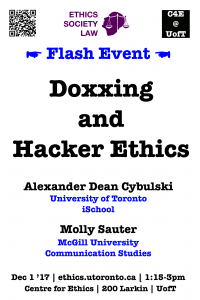
Category Archives: Undergraduate
Ethics of Food panel draws a crowd!
Gallery

This gallery contains 4 photos.
On Monday, November 20, 2017, a lively interdisciplinary panel, featuring Tammara Soma (Food Systems Lab), Matthew Feinberg (Rotman School of Management), and Stephen Scharper (School of the Environment & Anthropology) discussed food choices, production, consumption, and disposal, highlighting the complexity of the issues … Continue reading
Joint Working Group on Refugee Board Credibility Assessment
Under the direction of Hilary Evans Cameron, Postdoctoral Associate at the Centre for Ethics, undergraduate students from Trinity College’s Ethics, Society & Law program, along with students from Osgoode Hall Law School, came together at the Centre for Ethics for the final stage of a year-long research project. The Osgoode-Trinity Credibility Assessment Working Group set out to produce guidelines to help Refugee Board members make better decisions about refugee claimants’ credibility. Policy documents in Canada and abroad warn of the dangers of rejecting a claimant’s evidence based on certain kinds of factors (the claimant’s demeanour, memory for dates, minor inconsistencies, etc.). Rather than repeat these important warnings, the Osgoode-Trinity Credibility Assessment Guidelines propose a new way of looking at credibility assessment and its role in a refugee hearing, drawing on recent cognitive scientific research. These Guidelines, presented to the Immigration and Refugee Board in April 2017, use a novel evidence-based framework that suggests that Board members should approach this task with a new set of aims and processes.
The Ethics of Fake News
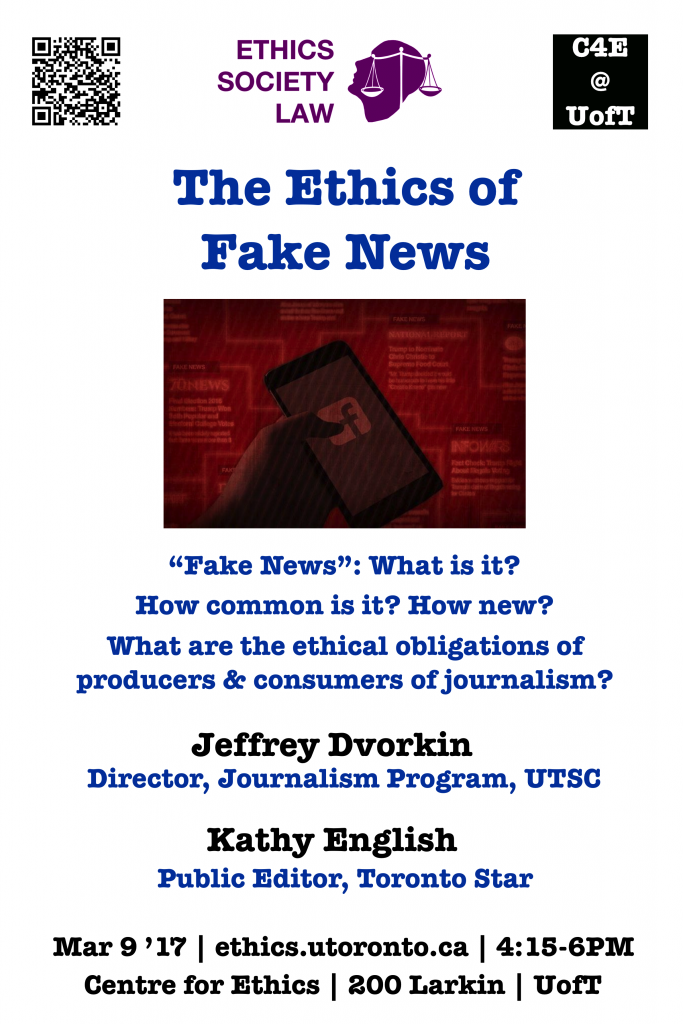
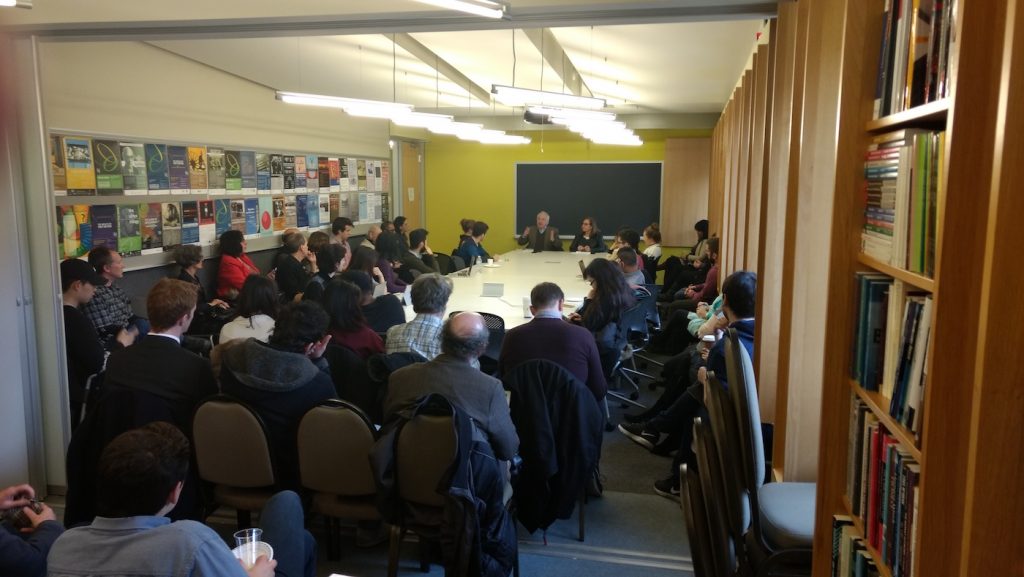 In March 2017, UofT’s Ethics, Society, and Law Students’ Association in collaboration with the Centre for Ethics hosted an academic panel discussion on The Ethics of Fake News. We are living in what is repeatedly referred to as the post-truth era, witnessing a loss of trust in traditional media outlets, and social media accelerating the circulation of false, unverified, and exaggerated information. The term “fake news” itself has become deeply controversial as its use has devolved from a critique of the proliferation of false stories and conspiracy theories, to an attack on the legitimacy of political opposition; even the pervasiveness of the problem remains contentious. This discussion will explore the ethical obligations that apply to both producers and consumers of journalism, recognizing that inflammatory distortion of facts is not a partisan issue, but a threat to the function of a free, open, and critical press.
In March 2017, UofT’s Ethics, Society, and Law Students’ Association in collaboration with the Centre for Ethics hosted an academic panel discussion on The Ethics of Fake News. We are living in what is repeatedly referred to as the post-truth era, witnessing a loss of trust in traditional media outlets, and social media accelerating the circulation of false, unverified, and exaggerated information. The term “fake news” itself has become deeply controversial as its use has devolved from a critique of the proliferation of false stories and conspiracy theories, to an attack on the legitimacy of political opposition; even the pervasiveness of the problem remains contentious. This discussion will explore the ethical obligations that apply to both producers and consumers of journalism, recognizing that inflammatory distortion of facts is not a partisan issue, but a threat to the function of a free, open, and critical press.
Jeffrey Dvorkin, lecturer and director of the Journalism Program at UTSC, and also a board member of the Canadian Journalism foundation, is a frequent commentator on ethics of media in the digital age and the future of the journalism industry.
Kathy English, the public editor of the Toronto Star, and a member of the Canadian Journalism Association Ethics Panel and the executive committee of the Canadian Journalism foundation brings a unique perspective through her direct experience of upholding and enforcing journalistic ethics and responsibility.
What’s Philosophy Got to Do With It? – Interview with Christine Korsgaard
What’s Philosophy Got to Do With It? – Interview with Valerie Jepson
 Recently, our undergraduate fellow, Jenny Commisso interviewed Toronto’s Integrity Commissioner, Valerie Jepson for another video in our “What’s Philosophy Got to Do With It?” series. Click here to watch.
Recently, our undergraduate fellow, Jenny Commisso interviewed Toronto’s Integrity Commissioner, Valerie Jepson for another video in our “What’s Philosophy Got to Do With It?” series. Click here to watch.
What’s Philosophy Got to Do With It? – Interview with Bob Rae
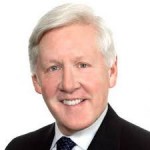 In conjunction with The Varsity, one of our undergraduate fellows, Jennifer Commisso, interviewed Bob Rae, Advisor to the Matawa Chief Tribal Council on leadership and Indigenous rights. Click here if you’d like to watch the interview.
In conjunction with The Varsity, one of our undergraduate fellows, Jennifer Commisso, interviewed Bob Rae, Advisor to the Matawa Chief Tribal Council on leadership and Indigenous rights. Click here if you’d like to watch the interview.
What’s Philosophy Got to Do With It? – Speaking with Barbara Jackman
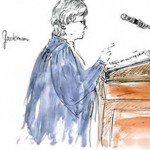 The Varsity, in conjunction with the Centre for Ethics at the University of Toronto speak with human rights lawyer Barbara Jackman on secret hearings and security certificates. To watch the interview, click here.
The Varsity, in conjunction with the Centre for Ethics at the University of Toronto speak with human rights lawyer Barbara Jackman on secret hearings and security certificates. To watch the interview, click here.
What’s Philosophy Got to Do With It? – On Morality and the Refugee Crisis Interview
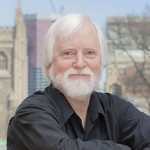 The Varsity, in conjunction with the Centre for Ethics at the University of Toronto speak with Political Science Professor Joseph Carens to speak about his open borders argument and morality. To watch the video, click here
The Varsity, in conjunction with the Centre for Ethics at the University of Toronto speak with Political Science Professor Joseph Carens to speak about his open borders argument and morality. To watch the video, click here

